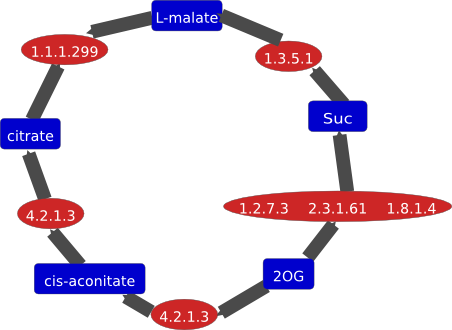EC Number   |
General Information   |
Reference   |
|---|
    1.1.1.213 1.1.1.213 | malfunction |
comparison of a common non-synonymous polymorphism, AKR1C3-2 in the gene encoding the enzyme 3alpha-HSD2/17beta-HSD5 and a synonymous SNP, rs248793, in SRD5A1, which encodes 5alpha-reductase: for caucasian males, carriers of the alcohol dependence-protective AK1C3-2 G-allele have higher levels of 5alpha-androstane-3alpha1beta-diol relative to the precursor 3alpha,5alpha-androsterone than C-allele homozygotes. AKR1C3-2 G-allele carriers exhibit greater increases in heart rate and stimulant and sedative effects of alcohol than C-allele homozygotes |
741389 |
    1.1.1.213 1.1.1.213 | physiological function |
enzyme in an iso-bile acid pathway |
760397 |
    1.1.1.213 1.1.1.213 | physiological function |
exposure of HCT-15 cells to cisplatin results in aquisition of cisplatin resistance and concomitant induction of isoform AKR1C3 and aldo-keto reductase AKR1C1 expression. The resistance lowers the sensitivity toward cellular damages evoked by oxidative stress-derived aldehydes, 4-hydroxy-2-nonenal and 4-oxo-2-nonenal that are detoxified by AKR1C1 and AKR1C3. Overexpression of AKR1C1 or AKR1C3 in the parental HCT15 cells mitigates the cytotoxicity of the aldehydes and cisplatin. Knockdown of both AKR1C1 and AKR1C3 in the resistant cells or treatment of the cells with specific inhibitors of the aldo-keto reductases increases the sensitivity to ciplatin toxicity |
724719 |
    1.1.1.213 1.1.1.213 | physiological function |
in LNCaP and LNCaP-AKR1C3 cells overexpressing isoform AKR1C3, metabolism proceeds via 5alpha-reduction to form 5alpha-androstane-3,17-dione and then (epi)androsterone-3-glucuronide. LNCaP-AKR1C3 cells make significantly higher amounts of testosterone-17beta-glucuronide. When 5alpha-reductase is inhibited by finasteride, the production of testosterone-17beta-glucuronide is further elevated in LNCaP-AKR1C3 cells. When AKR1C3 activity is inhibited with indomethacin the production of testosterone-17beta-glucuronide is significantly decreased. 4-Androstene-3,17-dione treatment stimulates cell proliferation in both cell lines. LNCaP-AKR1C3 cells are resistant to the growth inhibitory properties of finasteride, consistent with the diversion of 4-androstene-3,17-dione metabolism from 5alpha-reduced androgens to increased formation of testosterone |
725825 |
    1.1.1.213 1.1.1.213 | physiological function |
the enzyme 3alpha-hydroxysteroid dehydrogenase is involved in neuroactive steroid biosynthesis. Genetic variation in a region of chromosome 10 containing the genes AKR1C1, AKR1C3 and AKR1C4, which encode 3 isoforms of 3alpha-HSD, is associated with variation in subjective alcohol response. Enzyme mutant variant H5Q is associated with reduced risk of both alcohol dependence and bladder cancer, moderates the stimulant or sedative effects of alcohol |
741389 |





